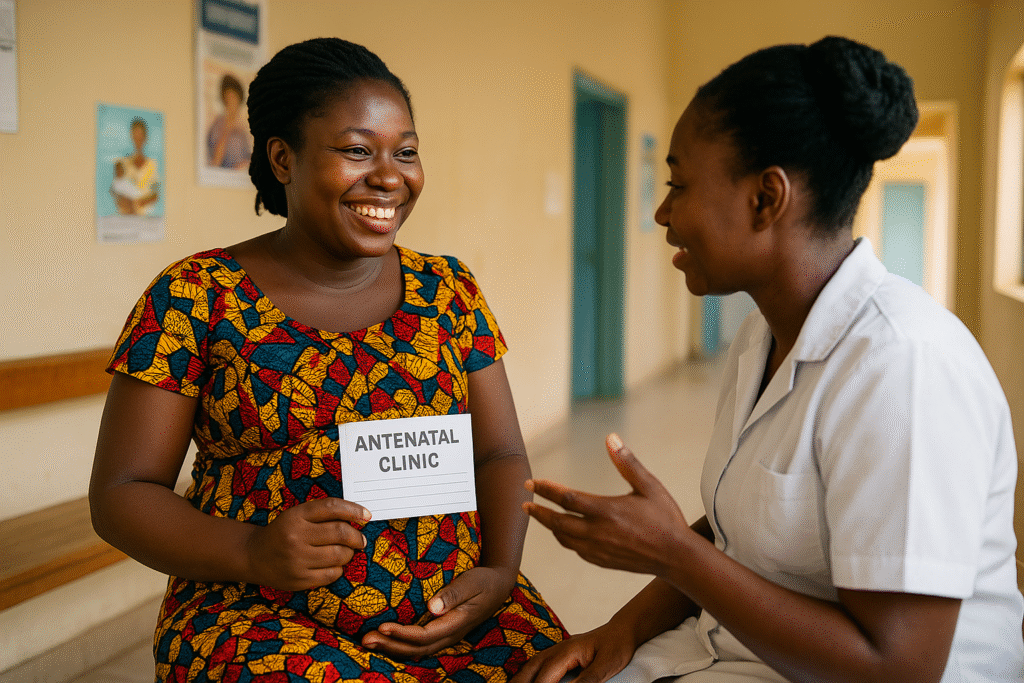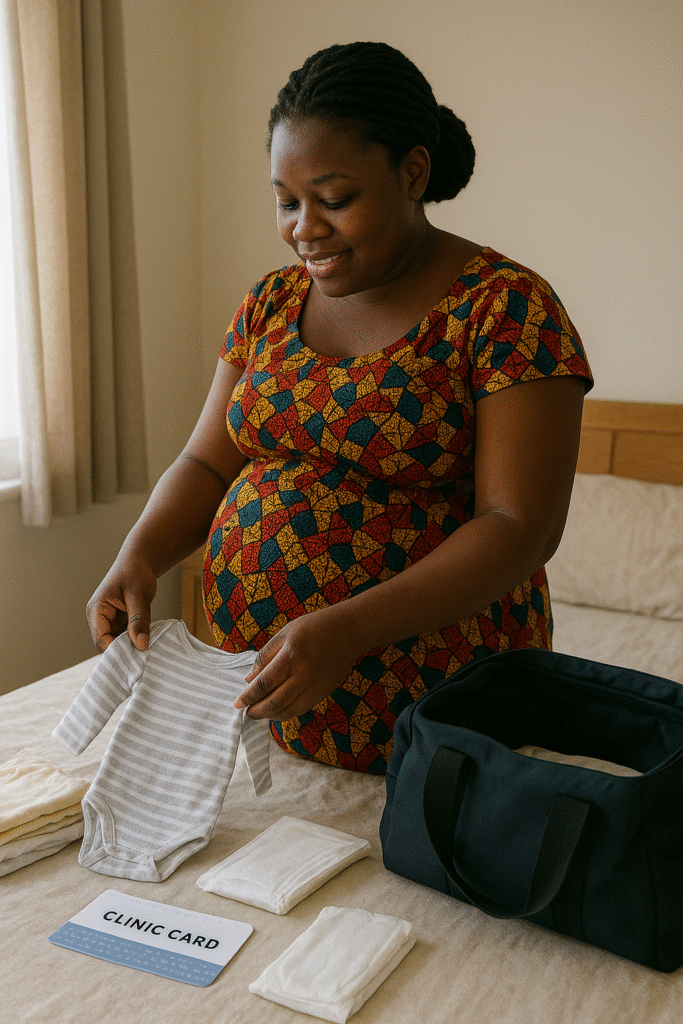Hello, mama-to-be! You’re in the right place to get the best pregnancy tips for your pregnancy journey in Ghana.
If you’re reading this, chances are you’ve just found out you’re pregnant or you’re already a few weeks along. First, congratulations! Pregnancy is such a beautiful journey, but let’s be honest — it also comes with lots of questions, fears, and surprises.
When I was pregnant, I remember the mix of emotions — excitement, anxiety, and sometimes even panic (a lot of times). One day I’d be craving kelewele at midnight, the next I’d be googling, “Is it normal to feel this tired in the first trimester?”
If you’re in Ghana, you know pregnancy also comes with its own set of realities: busy antenatal clinics, malaria prevention routines, nutrition advice that sometimes clashes with cravings, and, of course, family, community expectations, and preparing for labor.
So in this post, I’ll walk you through what to expect in each trimester, in simple, everyday language, with practical tips that apply right here in Ghana.
First Trimester (Weeks 1–12): Starting the Journey
The first trimester often feels like a secret chapter, one that you and your partner may share alone. You might be glowing, or you might be feeling sick every morning (or all day). My first trimester was difficult for me. I couldn’t eat or drink water. Throughout the entire first trimester, I experienced a severe stomach ulcer for three months.
There was a three-in-one sofa in the hall, and I lay on it all the time in the entire first trimester. Anytime I vomited, tiny blood clots came right after the puke. It wasn’t easy given that it was my first pregnancy. And they say that your first pregnancy can be difficult.
If this is your first pregnancy and you’re looking to do it right while you enjoy your pregnancy journey;
Here’s how to get through it:
Book your first antenatal visit early.

Don’t wait until you’re “showing.” As soon as you confirm you’re pregnant, go to the clinic. That first visit is where they’ll check your blood, urine, and general health. It’s also where you’ll get advice about supplements like iron and folic acid, which are super important for your baby’s development.
Take your supplements seriously.
Even if you feel fine, keep taking your iron and folic acid tablets. They protect you from anaemia and prevent birth defects. Think of them as tiny helpers working behind the scenes. The supplements I took protected my baby and made him healthy. Take the supplements your doctor recommends.
Morning sickness is real — and it’s okay.
If you can’t stand the smell of your favourite stew right now, don’t stress. Small meals, ginger tea, or even plain crackers might help. But if you’re vomiting too much, tell your midwife.
Protect your peace of mind.
The first trimester comes with so many emotions. Don’t bottle them up. Talk to a trusted friend, partner, or your midwife.
Second Trimester (Weeks 13–28): The Energy Stage

Ah, the second trimester — for many women, this is the “honeymoon phase” of pregnancy. Your energy often returns, your bump begins to show, and you may feel your baby’s first kicks. Pure joy! I ate every meal to my satisfaction at this stage.
Here’s what to focus on:
Malaria prevention is a must.
Ghana is malaria-endemic, and pregnant women are more vulnerable. At your ANC visits, you’ll be given malaria preventive treatment (usually in the form of tablets). It’s safe and important, so don’t skip it — it won’t harm your baby, so don’t believe what people say contrary to what the medicine is intended to do. And please, use your treated mosquito net at night.
Eat for strength, not for two.
You’ll hear aunties say, “You’re eating for two!” but really, it’s about eating smart. Local foods like beans, fish, kontomire stew, eggs, and fruits like pawpaw, watermelon, or oranges are great. Keep meals balanced — you don’t need double portions.
Stay active.
A short walk in the evening, gentle stretches, or even light housework counts as exercise. It keeps your body strong and prepares you for labour.
Enjoy the bonding moments.
When your baby kicks for the first time, call your partner or someone close to you. It’s perfectly okay to want to experience that moment by yourself if you wish. These little milestones make the journey sweeter.
Third Trimester (Weeks 29–40): Preparing for Baby

Now things are getting real! Your belly is heavier, sleep might be harder, and excitement (mixed with nervousness) is at its peak. I experienced persistent heartburn in my third trimester. It disturbed the little sleep I could get. In your third trimester, here’s how to make the last stretch smoother:
Keep up with antenatal visits.
They’ll become more frequent in the last trimester. These visits are crucial for checking your blood pressure, baby’s position, and overall health.
Pack your hospital bag early.
Trust me, don’t wait until labour starts. Pack your clinic card, ID, sanitary pads, baby clothes, nappies, water bottle, and a little cash for transport.
Know the warning signs.
Headaches that don’t go away, sudden swelling, blurred vision, or bleeding — don’t ignore these. Go straight to the clinic.
Make your birth plan.
Decide where you’ll deliver, who will be with you, and how you’ll get there. Ghanaian traffic has no sympathy for labour pains, so have a plan B for transport.
Rest and breathe.
Practise breathing exercises, sleep when you can, and lean on your support system. Those last weeks feel long, but they’re preparing you for the miracle of birth.
Ghana-Specific Tips Every Mama Should Know
- Malaria prevention is non-negotiable. Take the preventive treatment at ANC and sleep under your net. It saves lives.
- Local foods are your best friend. You don’t need fancy imported snacks. Banku with fish and greens, gari with beans, boiled yam with kontomire — simple meals packed with nutrients.
- Family and community support is gold. In Ghana, family and neighbours often rally around pregnant women. Accept the help — you’ll need it when the baby arrives.
- Write your questions down. ANC clinics can be crowded, and midwives are busy. Jot down your worries so you don’t forget when it’s your turn.
Quick Checklist: When to Call the Midwife
- Heavy bleeding
- Severe headache or blurred vision
- Reduced or no baby movement after 28 weeks
- Severe stomach pain
- High fever or persistent vomiting
If any of these happen, don’t wait. Go straight to the hospital right away.
Pregnancy is dynamic
Pregnancy is not a one-size-fits-all journey. In Ghana, it’s a blend of medical guidance, local wisdom, and the love of family and community. Take it one trimester at a time. Celebrate the small wins — your first ANC visit, your baby’s first kick, packing your hospital bag.
Most importantly, remember: you’re not alone. Every woman’s journey is unique, but the goal is the same — a safe, healthy mother and baby. You’ve got this, mama!
featured image by freepik








